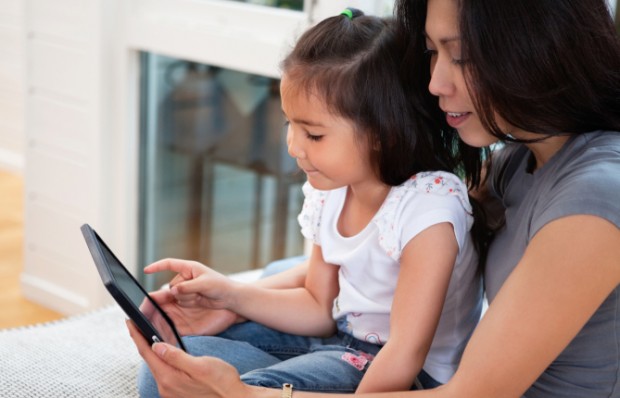The implication? Parents and teachers should choose basic e-books like the Kindle or Nook over enhanced e-books, such as the iPad, if they want a more literacy-focused co-reading experience with children. Prompting kids with questions that relate to the text, labeling and naming objects, and encouraging kids to talk about the book's content from their own perspective all elicit kids to be more verbal, and can lead to improved vocabulary and language development, the study states.
But if "engagement" is the objective, the issue gets murkier. When it came time to measuring "child-book" engagement, based on the child's direct attention and touch, more kids showed higher levels of engagement for the e-books than the print books, though a majority were equally engaged by both book types. Children also physically interacted with the enhanced e-book more than when reading either the print or basic e-book.
On the other hand, when measuring "overall engagement" —a composite of parent-child interaction, child-book interaction, parent-book interaction, and signs of enjoyment -- an interesting trend emerged: 63% of the parent-child pairs were as engaged reading the print book as they were when reading the e-book (both types); 6% of the pairs were more engaged with the e-book than the print book, compared to the 31% of pairs that were more engaged with the print book than the e-book.
"Kids loved the enhanced e-books," Chiong said. "It was great to see the level of engagement, how much they were enjoying it -- and that's one of our goals as parents, is engaging kids. If this can do that, especially in kids who might not otherwise be interested, it’s perfect."
Chiong added that this study focused on younger kids -- questions and priorities will be different for measuring the differences for older readers.
PARENTS' EXPERIENCE
Parents' comments showed a wide range of reactions. Some parents appreciated the iPad's effect on their young readers.
"They're able to hear the words...It came alive. I don't have to do the reading," said the mother of a three-year old. "Not only that, they pay more attention to the iPad. Sound effects were an excellent idea -- they like the books with sound effects."
Another parent appreciated the e-books' prompts. "Actually.. [I liked the e-book] because I don't know what questions to ask sometimes and the iPad showed what to repeat and say," said a mother of a five-year old boy.
NEXT STEPS
For this "quick study," which researchers recognize is limited by the small number of those surveyed, the intent is to help guide more comprehensive research in the future.
"This whole explosion of e-books has been great, and we love seeing what’s happening with the innovation, but now it’s time to start thinking more purposefully and thoughtfully into what goes into the creation of an e-book," Chiong said.
Researchers advise that e-book designers be discriminating about the types of features they add to enhanced e-books, "especially when those features do not directly relate to the story," the study states. Parents should also be able to have more control over settings to features so they can tailor the reading experience to their own needs.
Researchers believe a similar study should be done with a larger and more representative sample of participants and books, and should examine what types, combinations, and placement of e-book features help or hinder learning and conversation, and should explore how different populations (e.g., lower income families, non-native English speaking families) use them.


